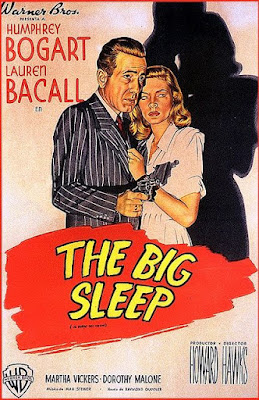If I could read your mind, little sister
If I could get inside your mind
In Raymond Chandler’s The Little Sister, the oh-so-world-weary private eye Philip Marlowe visits a slick Hollywood talent agent and makes him a proposition.
One of the agent’s clients is a young, up-and-coming female movie star who’s hanging around with a gangster. If word of their relationship gets out, the resulting scandal would derail her movie career just as it’s getting off the ground.
 |
Marlowe has come into possession of some compromising photographs of the beauty and the gangster, and he offers to destroy the photos and take other steps to protect her if the agent hires him.
The agent is suspicious – he asks how much all this will cost, assuming that the private eye will try to extort a sizable amount of hush money from him. But all Marlowe wants is to be paid his regular daily fee – which is quite modest – while he works on behalf of the young star.
* * * * *
It all sounds too good to be true to the agent. But he decides to hire Marlowe, offering this explanation for his act of faith:
One of these days I’m going to make the mistake which a man in my business dreads above all other mistakes. I’m going to find myself doing business with a man I can trust and I’m going to be just too goddamn smart to trust him.
The agent is used to dealing with people who cajole him, lie to him, and try to bribe him in hopes of getting him to do what they want. He can handle such people in his sleep – he’s too smart to be outsmarted by the likes of them.
But he's smart enough to fear not only being outsmarted, but also outsmarting himself – so he decides not to look the gift horse that Philip Marlowe is in the mouth.
* * * * *
The agent's decision to trust Marlowe is the correct one, of course. Marlowe’s a modern-day knight, albeit one dressed in an off-the-rack suit rather than in shining armor.
Of course, as one author has noted, there’s one big difference between Marlowe and the knights who lived in the golden age of chivalry. Marlowe wants to be chivalrous, but the damsels in distress he is constantly saving are hardly pure in heart – or anywhere else, for that matter.
* * * * *
There have been roughly a dozen movies based on Raymond Chandler’s Philip Marlowe novels.
The most famous is the The Big Sleep (1946), which starred Humphrey Bogart and Lauren Bacall. (William Faulkner was one of the three co-writers of the screenplay.)
 |
The Big Sleep is a classic, but I think Robert Altman’s 1973 film, The Long Goodbye – which featured Elliott Gould’s very eccentric take on the Marlowe character – is just as good.
My personal favorite among all the Marlowe movies is Marlowe (1969), which was an adaptation of The Little Sister.
James Garner portrayed Marlowe in Marlowe. The cast also included Carroll O’Connor, Sharon Farrell, Gayle Hunnicut, Rita Moreno – who stole the show – and a very young Bruce Lee.
The talent agent whose words are quoted above was played by the wonderfully un-actorish character actor, William Daniels, who is best known for his Emmy-winning work on the medical drama series St. Elsewhere and his portrayal of G. Gordon Liddy in Blind Ambition, the Watergate miniseries.
 |
James Garner in “Marlowe” |
Marlowe was a box-office bust, and most of the critics panned it. I say f*ck those critics and the horse they rode in on.
* * * * *
Marlowe has a lot to recommend it, but my very favorite thing about it is its theme song.
Click here to watch the opening credit sequence of Marlowe and to listen to “Little Sister.”
Click below to buy the song from Amazon:



No comments:
Post a Comment